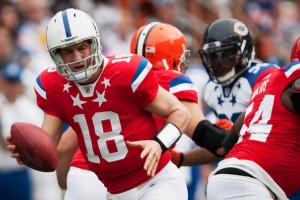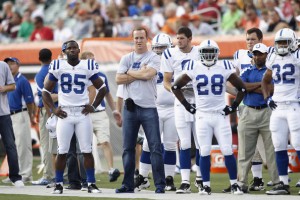Is This The End For Peyton Manning?
Given his remarkable consistency, success and durability during 17 years as a college and professional quarterback, it is hard to contemplate that the end could be near for one of the greatest quarterbacks of this generation. However, following his second next surgery of the offseason and third in two years, it is conceivable that even Peyton Manning has found an opponent he can’t out-maneuver.
Now 35 years of age, Manning’s inability to quickly recover from offseason neck surgery could be partly a result of the NFL lockout and inability to receive treatment from his regular trainers, but it could also be a result of age and years of continual pounding from large men trying to inflict physical harm on him.
Regardless of why, it is now apparent that Manning is unlikely to play in the near future and it wouldn’t be a complete surprise if he misses the entire season. At that point, it will only be natural to wonder if Manning will ever be able to return to the NFL.
While every injury is certainly different, Manning isn’t the first great NFL player to suffer a neck injury. Both Sterling Sharpe and Michael Irvin had their careers ended by neck injuries. Since his injury didn’t result in immediate diagnosis of an end to his career, there are obviously differences in the severity, but now after three surgeries there are certainly concerns about his long-term health.
If Manning is able to return to the field, whether it be this season or in 2012, I have little doubt that he will still have the will of a champion, but given his age, the question will be if he still has the arm strength and physical ability to maintain the high level of performance he has displayed throughout his career.
We have long considered Manning to be a great quarterback, but when analyzing his 13 years of NFL work, it is amazing to see just how impressive he has been from the beginning until the end.

Was the 2011 Pro Bowl the final performance for Manning in this calendar year and maybe even for his career?
As a rookie, Manning completed 56.7% of his passes for 3,739 yards and 26 touchdowns. That is quite an impressive season, whether for a rookie or a veteran, but Manning has eclipsed each of those numbers in every single one of his 12 additional seasons.
In fact, his completion percentage has been at least 62% every year and he has completed 65% or better of his passes in each of the last seven seasons. He also has exceeded 4,000 yards passing 11 times and 30 touchdown passes six times.
Even if he never throws another pass, Manning would complete his NFL career third all-time in touchdown passes (399) and yards passing (54,828), fourth in completion percentage (64.9%) and sixth in passer rating (94.9).
I spent time this weekend watching some of Manning’s games from the past, including his performance last season against his brother Eli and the Giants and a close loss to Tom Brady and the Patriots. Even though I have watched Manning surgically dissect defenses for years, what struck me in watching those two games was that Manning could perform at a high level no matter who was around him.
In the early season game against the Giants, Manning completed five passes to tight end Dallas Clark and Joseph Addai rushed for 92 yards in the 38-14 victory. By the time the Colts faced the Patriots in the 10th week, both Clark and Addai were out of the lineup. Instead, Donald Brown was the leading rusher and Manning threw two touchdown passes to Blair White, a rookie free agent from Michigan State. In 2010, Manning completed passes to 15 different receivers and tossed touchdown passes to seven different players.
In 2010 the Colts made the playoffs for an NFL record ninth straight season and has been a playoff team in 11 of the 13 seasons Manning has been under center.
While Manning has had the benefit of some outstanding skill players during his career like Marvin Harrison, Edgerrin James, Reggie Wayne and Clark, he also has turned many average players into solid NFL performers. In recent years, he has also continued his great performance despite an inferior running game.
The challenge for the Colts in his absence is whether Kerry Collins (at 38-years-old one of the few NFL quarterbacks older than Manning) can take the current cast of skill players and get the same soufflé as Manning. If not, it could be a long year for the Colts.
It isn’t yet time to write the obituary on Manning’s amazing career, but for the first time since he came into the league, we are reminded that he isn’t a man of steel and in fact will not play forever.
Manning’s career will eventually culminate in a bust in the Pro Football Hall of Fame, but let’s hope its significantly more than five years before we see him in Canton.

Every once in awhile, any time I spot a plain comment which says positive stuff, I remove the website link, edit the e-mail address but still post it
It’s not flash compatible still nevertheless It’ll run flash when Adobe’s done with it. Well, they’re just now releasing Adobe flash player for Android phones. The Operating system do multitask just like iOS. It’s closing but save the actual state of the app furtheremore when you open it again, the app wiil be be where you left it.No copy and paste. confidently Copy and paste will be replaced by smart linking. I hope there will be adding full copy and paste in the next weeks.
I always like to visit such a informative sites that providing the useful content like this,